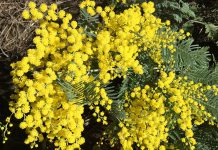Gardening trends come and go. Who doesn’t love to read garden magazines with all those beautiful photographs during the winter and dream about your garden’s potential. Ditto for all the gardening blogs on the internet that are written by some very talented people who seem to have more free time than most of us. Here are some of the trends for 2024. You might already have incorporated some into your garden so pat yourself on the back and read on.
Like last year, enhancing your garden with edibles is again at the top of the list although now it’s got a fancy new name—edimentals. Coined by writer Stephen Barstow of Norway, edimentals are plants that are both edible and ornamental, therefore serving more than one function in the garden.
My friend Joy has foraged in her garden for years. You never know what’s going to be in one of her salads or soups. She would know that Pineapple Sage (Salvia elegans) is not only a fantastic fall-blooming perennial, but its scarlet flowers are great in salads, herbed cheeses and dressings.
Here are more reasons to add edimentals into your garden. Edimental plants are easy to care for. Perennials, shrubs and trees have fruiting times throughout the year rather than all at once. Their deeper roots make them hardier than annuals and better able to deal with drought or the occasional pest infestation. And when sprinkled throughout the entire garden, edimentals are a great way to draw kids out of the house and into the garden, encouraging them to forage while they wander. The flowers and tubers of both Dahlias and daylilies are examples of edimentals.
Another trend for 2024 isn’t really new. Naturalistic gardens consist mainly of native plants with drifts of flowers and grasses that look like a prairie that appears to have naturally re-seeded itself but in reality plants are carefully placed and chosen. The focus of a naturalistic garden is on a diversity of plants that blend with the surrounding nature and welcomes wildlife and pollinators. It’s neither manicured nor neglected. Sounds easy, doesn’t it?
Rethink that lawn this spring for a truly stunning yard.
Rain gardens are again trending. Around here it’s always a good idea to preserve runoff. Slow it, spread it, sink it should be our motto: catch the water, hold it on-site and get it back into the ground and out of storm drains. Roof and driveway pollutants from rain runoff are filtered by plant roots in a rain garden. Plants chosen for rain gardens need to handle the feast or famine amounts of water. Many native plants, grasses and sedges with their long, deep root structures.
The fourth trend for 2024 is learning to love bugs. While I can see that a few aphids, spider mites and whiteflies are not going to keep me up at night as long as the infestation isn’t too bad, I’m not sure about slugs and snails. The Royal Horticultural Society recently declassified slugs and snails as pests. The skunk and raccoon who frequent my garden will be happy to learn this. Me? Not so much.
Another trend is adapting and growing with a changing climate that is becoming hotter/colder, wetter, drier. Here are a few things you can do:
Choose the right plants that are more heat, cold, drought and pest resistant. Adjust your watering practices. Shift planting and harvesting dates and be prepared for extreme weather with row covers to protect from unexpected frost, shade cloth for excessive heat and materials for wind breaks.
Personally I embrace the smaller garden. You can create an instant meditation garden that encourages you to stop and sit for a couple minutes by placing a small bench where you can view something interesting in your garden. Small gardens are not only compact, they are easier to care for. Containers on the patio or deck allow you to grow plants for food as well as for the birds and the bees. There are more new dwarf vegetable, herb and flower varieties being introduced every year.
It’s always a good idea to remove overgrown shrubs and replace them with water smart, easy-to-care-for plants that will stay the right size in a smaller space. There are new compact and dwarf versions of old plants that have been garden favorites for a very long time. The reason they have endured is because they are reliable. Good reason to look again at some old favorites.
Everything old is new again.
Jan Nelson, a landscape designer and California-certified nursery professional, will answer questions about gardening in the Santa Cruz Mountains. Email her at ja******@*ol.com, or visit jannelsonlandscapedesign.com.












